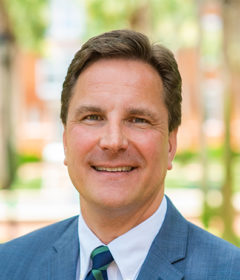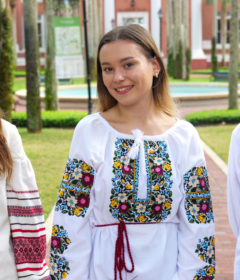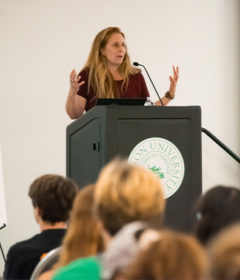Stetson Research Grants Provide Educational Opportunities for Youth

 Five Stetson University research projects have a chance to make a difference in young people’s lives thanks to The Nina B. Hollis Institute for Educational Reform. The university’s institute collaborates with local community leaders, district personnel and educational agencies to champion and promote the advancement of teaching and learning by providing seed grants to support innovative research that expands P-12 educational opportunities for children in impoverished areas.
Five Stetson University research projects have a chance to make a difference in young people’s lives thanks to The Nina B. Hollis Institute for Educational Reform. The university’s institute collaborates with local community leaders, district personnel and educational agencies to champion and promote the advancement of teaching and learning by providing seed grants to support innovative research that expands P-12 educational opportunities for children in impoverished areas.
Each fall, the Hollis Institute’s selection committee grants Nina B. Hollis Research Impact Awards (NBHRIA) to recipients whose research projects explore ways to benefit and improve P-12 educational outcomes for youth who are marginalized in society. This year’s research projects are exposing participants to experiential learning and fostering educational growth.
“We hope that these seed grants, which could each be funded for up to three years, will allow the research investigators to seek outside funding to extend or expand these projects,” said Bette Heins, chair of the Nina B. Hollis Institute for Educational Reform. “Further, we hope the dissemination of the results of these programs will encourage other universities, community agencies and businesses to support this type of creative and exciting reform.”
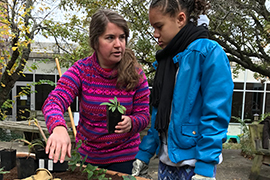
The research projects are:
Louise S. McInnis Elementary School Garden in DeLeon Springs
Sarah Cramer, Ph.D., Brown visiting teacher-scholar fellow in sustainable food systems, believes gardening at school benefits all children, regardless of “age, income or academic abilities.” The McInnis garden-based learning research project’s principal investigator Cramer and co-investigators Mercedes Tichenor, Ed.D, professor of education and Wendy Anderson, Ph.D., professor of environmental science and studies, are continuing to build on the school’s existing garden.
“Research shows that regardless of school environment or type of student, effective garden-based learning programs improve academic achievement, increase student physical activity and decrease behavior issues and the fear of trying new foods while increasing fruit and vegetable consumption,” said Cramer.
Instruments of Healing
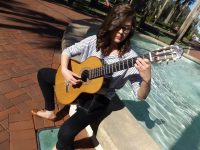
Youth from Edith I. Starke and Woodward Elementary Schools in DeLand who are registered in the House Next Door’s Homework Club are participating in the research project, Instruments of Healing in collaboration with the House Next Door’s Homework Club: Creating Music Educational Opportunities for Children. Stetson guitar performance junior Lauren Baucum, founder and president of Instruments of Healing, and Stephen Robinson, D.M., professor of music and faculty advisor, hope to help students form positive identities, and boost self-esteem and self-confidence through music.

“Music education not only improves a child’s confidence, it instills pride and helps children develop real-life skills, including critical thinking, creative problem solving, team work and effective communication,” said Robinson.
Stetson Ethics Education Development (SEED)
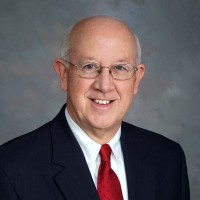
High school students can learn ethics and moral decision making while examining ethical implications of business and how leadership impacts society as a whole, according to project researchers Jim Beasley, Ph.D., professor of management and John Tichenor, Ph.D., associate professor of management. They feel providing business ethics education to high schoolers will provide the foundation for becoming future business leaders.
“We hope to provide an experiential learning opportunity for high school students that will be a significant component of their development into ethical business leaders in the future,” said Beasley.
Florida School to School Pipeline
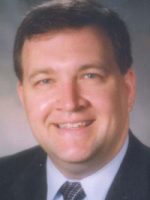
Preventing teenage foster children from taking a path to prison is the goal of this research project. Ann Piccard, LL.M. and J.D., professor of law and project researcher, wants to help teens in the foster program work on a college plan instead.
“The primary goal is to divert teens from the revolving doors of juvenile and criminal courts to the open doors of higher education,” said Piccard.
Stetson’s Cyber Security Summer Camp
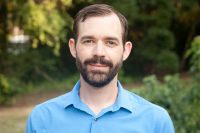
Scholarships for this camp are available to academically talented high school students who may not otherwise have a chance to attend. Project researcher Joshua Eckroth, Ph.D., assistant professor of computer science, would like to give students from under-represented groups an opportunity to expand their knowledge and possibly pursue a STEM-related degree at Stetson.
“We expect these scholarships to increase the number of under-represented and high-achieving students that attend Stetson in STEM fields, and expect to see greater retention in these populations,” said Eckroth.
-Sandra Carr

